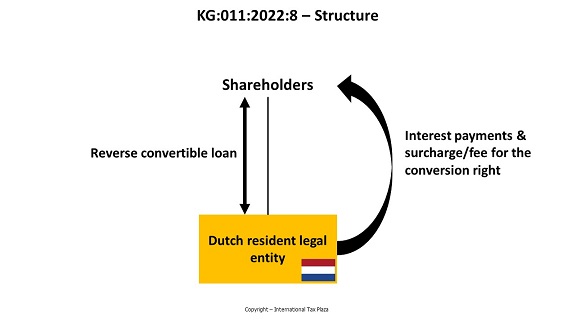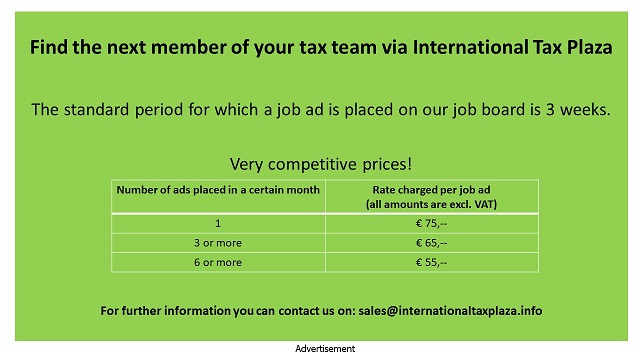In this article we discuss position paper KG:011:2022:8 of June 16, 2022. In this position paper the Knowledge Group special profit provisions for Dutch corporate income tax purposes of the Dutch tax authorities answers the question whether in its view a reverse convertible bond loan qualifies as a capital contribution or as the granting of a loan for Dutch corporate income tax purposes. The knowledge group furthermore answers the question whether or not the surcharge that is paid for the conversion right (in the underlying case a right that can be exercised by the debtor) is deductible for Dutch corporate income tax purposes.
The underlying case
- X BV is in need of funding and asks its shareholders to fund them with EUR 100 million;
- For various reasons, a flexible instrument was chosen, namely a reverse convertible loan (hereinafter: 'the loan' or ' the reverse convertible');
- The reverse convertible is subordinated and has a term of 51 years;
- In principle, the interest is to be paid annually or, if this is earlier, at the moment that the the reverse convertible is repaid. If desired, X BV can defer the interest payments due on the reverse convertible at its own discretion. The deferred interest remains due and is also independently interest-bearing. In addition, this deferred interest must in all cases be paid by X BV (as a last resort via settlement upon conversion). Even in the event of bankruptcy, etc. X BV therefore remains obliged to pay the deferred/suspended interest;
- Under the reverse convertible, X BV is entitled – but not the obliged – to convert the amounts due into ordinary shares X BV (the conversion right). X BV can invoke the conversion right if this has been agreed with more than 75% of the creditors or if a so-called 'Conversion Moment' arises;
- X BV is entitled – but not the obliged- to exercise the conversion right at a Conversion Moment;
- The reverse convertible is interest bearing. The interest consists out a fixed coupon rate that is determined on the basis of a predetermined mechanism whereby a base rate is increased with a fixed surcharge. This surcharge includes a surcharge for the conversion right;
- The fixed interest rate is reviewed once every 8 years, whereby the interest rate is determined similarly based on the interest rates that are applicable at that time; and
- It has been established that under civil law the reverse convertible does not constitute a contribution of (share) capital.

Questions
- Does the reverse convertible loan entered into by X BV constitute the contribution of capital for Dutch tax purposes?
- Is the surcharge for the conversion right that X BV pays deductible for Dutch tax purposes?
Answers
Question 1
No. it’s is a debt. Under civil law it does not qualify as a contribution of (share) capital. In this case a requalification for tax purposes is not possible.
Question 2
No. The surcharge that is paid concerns a payment that:
- primarily must be regarded as taking place in the context of a relationship between the company (X BV) and the holder of the reverse convertible which, from the date of issue of the reverse convertible, must be equated with the relationship between a company (X BV) and its shareholder;
- in the alternative, must be regarded as taking place for the possible acquisition of share capital in the future.

Requalification into a capital for Dutch tax purposes
In their position paper the Dutch tax authorities have included a very extensive consideration. In this article we will focus on the remarks the Dutch tax authorities make regarding the requalification of a loan (under civil law) into capital for tax for Dutch tax purposes. If a loan is requalified into capital the interest payments are non-deductible for Dutch corporate income tax purposes.
In its judgment of May 15, 2020 the Dutch Supreme Court (again) ruled that for the purpose of answering the question whether or not a loan should be regarded as a capital for tax purposes, in principle the civil-law form of that loan is decisive is (Dutch Supreme Court May 15, 2020, ECLI:NL:HR:2020:874).
If, as in the underlying case, there is no contribution of (share) capital under civil law, it is according to the Dutch Supreme Court for tax qualification purposes, in principle decisive whether - judged according to the civil law form - a repayment obligation exists. In the underlying case that is the case: after 51 years the loan must be repaid without the possibility of extension. The possibility of conversion does not affect the repayment obligation. Only under certain circumstances – which are determined based on objective criteria – is it possible for X BV to convert the loan into share capital. Due to the repayment obligation, the loan does therefor not qualify as capital for tax purposes.
For tax purposes a loan can then still be reclassified as capital if one of the three known exceptions applies (see, among others, the aforementioned judgment of the Dutch Supreme Court of May 15, 2020, ECLI:NL:HR:2020:874 and the Dutch Supreme Court of January 27, 1988, ECLI:NL:HR:1988:ZC3744) in case of a:
- Schijnlening;
- Bodemlozeputlening; or
- Deelnemerschapslening
Schijnlening
In short, a schijnlening (sham loan) exists if the parties actually intend to provide capital but make it look like as if a loanwas granted.
Bodemlozeputlening
A Bodemlozeputlening (bottomless pit loan) exists when a shareholder provides a loan to its subsidiary of which he knows, or should know, at the time of granting that the loan cannot be repaid in full or at all.
Deelnemerschapslening
In order for a loan to qualify as a (deelnemerschapslening) participation loan, the following three cumulative conditions must be met:
- The loan has no fixed term or a term exceeding 50 years and is only due and payable in the event of bankruptcy, a moratorium or liquidation of the legal entity; and
- The debt is subordinated to all unsecured creditors; and
- The remuneration due is profit depending.
Remark ITP
Please note that if a loan is not requalified as capital, this not automatically means that the interest payments due are (fully) deductible. Obviously in such cases the normal interest limitation rules apply.
One of the interest limitation rules that might need extra intention when considering to enter into a reverse convertible loan agreement is laid down in Article 12aa, Paragraph 1, sub a of the Dutch corporate income tax Act (Hybrid mismatches). Article 12aa, Paragraph 1, sub a of the Dutch corporate income tax Act arranges that when determining the profit of a Dutch taxpayer fees or payments made under a financial instrument are non-deductible at the level of the Dutch taxpayer to the extent that they result in a deduction at the level of the debtor without an inclusion in the tax base of the creditor(s) within a reasonable period of time due to differences in the qualification of the instrument or the payments under it.
In other words if parties intend to enter into a cross-border reverse convertible loan agreement it is important to check how the reverse convertible loan qualifies for tax purposes at the level of the creditor(s) and whether or not the fees and interest will be included in the tax base of the creditor(s) and if so when.
The full Dutch text of the position paper can be found here.
Copyright – internationaltaxplaza.info
Follow International Tax Plaza on Twitter (@IntTaxPlaza)




